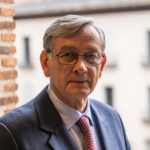Participants discussed the contribution of the concept of “Shared Societies” developed by the Club de Madrid to the debates on the post-2015 development agenda. The Deputy Permanent Representative of Italy Ambassador Inigo Lambertini highlighted the “innovative thinking” of the shared societies approach and its role as a “catalyst for partnership” in the current development agenda framework. This notion of society where all individuals and constituent groups hold status as equally contributing participants demands concrete commitments, likewise the Shared Society´s approach is and requires a “strong political leadership” as it was stressed by Ambassador Andrej Logar, Permanent Representative of Slovenia to the United Nations.
President Danilo Turk highlighted that the idea of share societies has the same “ethical roots of the United Nations Millennium Development Goals project and substantive interrelations between the emerging development agenda”. In this context, Amina Mohammed, Special Advisor to the UN Secretary General on Post-2015 Development Planning, highlighted “inclusiveness as a key element for a transformative agenda”, and identified “principles in the development agenda that clearly embrace the concept of shared societies”.
Furthermore, Sanjay Reddy, Associate Professor at the New School for Social Research, NY, and long-time member of the SID Journal Editorial Board, stressed that the idea of shared societies is perfectly compatible with sustainable prosperity and thus a key element to be considered in the development agenda process. In addition, he pointed out the need to seek a third way other than “assimilation” and simple “cohabitation” in order to build a “healthier form of collective identities in societies”, which might prevent the development agenda process for devolving into limited visions of what shared and inclusive societies encompass.
Despite progress in the context of the development agenda, there are still several challenges posed by accountability to deliver, credibility gaps and the data revolution, among others, needed to be addressed. The Club of Madrid and the Shared Societies Project can play a contributing role in rethinking social development by creating opportunities for dialogue among organizations working on development and promoting deeper discussions about priorities of democracy and its impact on social policy making.
